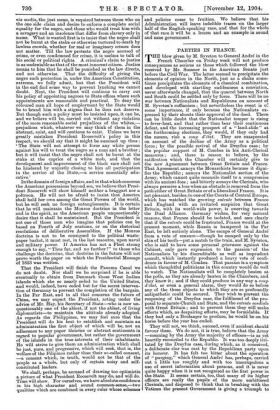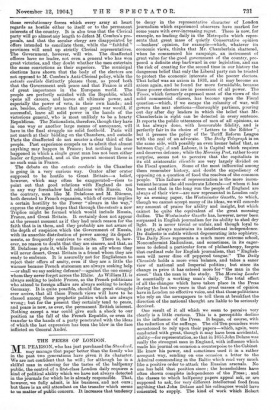T HE blow given by M. Syveton to General Andre in
tha French Chamber on Friday week will not produce consequences as serious as those which followed the bloW received by Mr. Sumner in the American Senate just before the Civil War. The latter seemed to precipitate the elements of opinion in the North, just as a shake some- times precipitates the elements of a chemical combination, and developed with startling suddenness a conviction, never afterwards changed, that the quarrel between North and South could be settled only by force. There will be no war between Nationalists and Republicans on account of M. Syveton's ruffianism ; but nevertheless the event is of some importance, if only because the Nationalists ex- pressed by their shouts their approval of the deed. There can be little doubt that the Nationalist temper is rising to fever-heat, and that rather than bear their continuous defeat, and the increasing prospect of a " land-slide " at the forthcoming elections, they would, if they only had the means, risk a coup d'etat. They are exasperated on account of the decline of the Army as a political force ; by the possible revival of the Dreyfus case ; by the popular support of M. Combes in his Anti-Clerical measures ; and, there is reason to believe, by the ratification which the Chamber will certainly give to the new Agreement between Great Britain and France. That Agreement annoys the Monarchists because it digni- fies the Republic ; annoys the Nationalist section of the Army, which cannot quite reconcile itself to a compromise with its ancient foes ; and bitterly annoys the Clericals, who always perceive a loss when an obstacle is removed from the path either of Great Britain or of a liberalised France. It is not pleasant, besides, to one of the Courts of Central Europe, which has watched the growing entente between France and England. with an irritated suspicion that Great Britain, with its world-wide power, is swerving towards the Dual Alliance. Germany wishes, for very natural reasons, that France should be isolated, and sees clearly that if the entente could be frustrated, France would at the present moment, while Russia is hampered in the Far East, be left entirely alone. The escape of General Andre from a, vote of censure—though he escaped only by the skin of his teeth—put a match to the train, and M. Syveton, who is said to have some personal grievance against the Cabinet, only gave expression to the passion' of the Nationalists by his discreditable as well as imprudent assault, which instantly produced a heavy vote of confi- dence in favour of M. Combes. That passion is a symptom which thoughtful politicians in this country would do well to watch. The Nationalists will be completely beaten at the polls, as they are already beaten in the Chimbers, and they know it ; and if they could produce in any way a coup d'etat, or even. a general alarm, they would do so before any of the three objects to which they are so profoundly antipathetic could be secured. They wish to prevent the reopening of the Dreyfus case, the fulfilment of the pro- posal to separate Church and State, and the entente cordiale with Great Britain ; and to prevent them they will make efforts which, as despairing efforts, may be formidable. If they had only a Boulanger to produce, he would be on his horse before the year has ended.
They will not, we think, succeed, even if accident should favour them. We do not, it is true, believe that the Army —meaning by the Army the majority of officers—is as yet heartily reconciled to the Republic. It was too deeply irri- tated by the Dreyfus case, during which, as it conceived, a deliberate slur was cast by the Republican party upon its honour. It has felt too bitter about the operation of " purging," which General Andre has, perhaps, carried out a little too roughly and with too unscrupulous a use of secret information about persons, and it is never quite happy when it is not recognised as the first power in the State. It seems certain, too, that many of its higher officers are really the pupils of the more embittered Clericals, and disposed to think that in breaking with the Vatican the present Government is giving a triumph to those revolutionary forces which every army at heart regards as hostile either to itself or to the permanent interests of the country. It is also true that the Clerical party will go almost any length to defeat M. Combes's pro- posals, and that the secular clergy are disappointed by offers intended to conciliate them, while the " faithful " provinces will send up strictly Clerical representatives. The Government, however, will win. The disaffected officers have no leader, not even a general who has won great victories, and they doubt whether the men entertain the same convictions as their superiors. The municipal elections have shown that the body of the electors are not opposed to M. Combes's Anti-Clerical policy, while the entente cordiale distinctly pleases them, as proof both that the Government seek peace and that France is still of great importance in the European world. The people are perfectly satisfied with the Republic, which opens all careers, and leaves all ultimate power, and especially the power of veto, in their own hands ; and are, besides, clearly aware that any great war would, if successful, leave all solid power in the hands of the victorious general, who is most unlikely to be a hearty Republican. The Nationalists, therefore, though they have in one way or another large means of annoyance, will have in the final struggle no solid foothold. Paris will not march at their bidding on the Chambers, and outside Paris the disaffected do not muster a clear third of the people. Past experience compels us to admit that almost anything may happen in France ; but nothing has ever happened in which a single great man has not been either leader or figurehead, and at the present moment there is no such man in France.
The debate on the entente cordiale in the Chamber is going in a very curious way. Orator after orator supposed to be hostile to Great Britain—a belief, however, which may often be exaggerated—rises to point out that good relations with England do not in any way foreshadow bad relations with Russia. On the contrary, men like M. Delafosse and M. Etienne, both devoted to French expansion, which of course implies a certain hostility to the Power " always in the way," express the strongest hopes that through the entente a new Triplice might be formed which would include Russia, France, and Great Britain. It certainly does not appear at the present moment as if they had much reason for the faith that is in them, and they probably are not aware of the depth of suspicion which the Government of Russia, with its anarchic distribution of power among its depart- ments, so frequently contrives to excite. There is, how- ever, no reason to doubt that they are sincere, and that, as M. Delafosse puts it, while Russia is an ally whom they will never desert, Great Britain is a friend whom they are ready to embrace. It is assuredly not for Englishmen to reject their offers of amity, even if they are a little the warmer because French statesmen are always seeking help —or shall we say seeking defence?—against the one enemy whom they never forget across the Rhine. As William II. is always seeking to isolate France, so the French politicians who attend to foreign affairs are always seeking to isolate Germany. It is quite possible, should the great struggle ever arrive, that all these French views will have to be classed among those prophetic politics which are always wrong; but for the present they certainly tend to peace, and peace is now, as ever, the permanent British interest. Nothing except a war could give such a shock to our position as the fall of the French Republic, or even its transfer to the hands of a party penetrated with the ideas of which the last expression has been the blow in the face inflicted on General Andre.
THE PRESS OF LONDON.











































 Previous page
Previous page